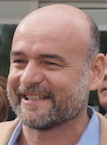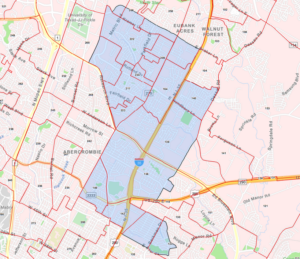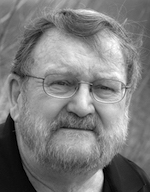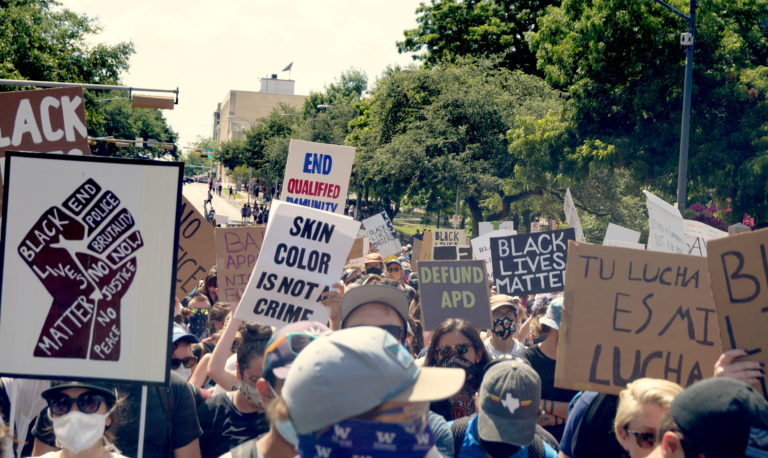Guzmán differs with outgoing incumbent on land-use policy
Monica Guzmán, a community organizer and political activist, is running for a place on Austin City Council with the stated goal of promoting “neighborhood stability” in the city’s land-use regulations.
“Land use needs to be equitable. It needs to be resident-centered,” she told the Bulldog in an interview.
Guzmán is a native Austinite who lives in the Jamestown neighborhood near US Highway 183 and North Lamar Boulevard. She has deep roots in what became District 4 going back to her childhood. She grew up in the North Shoal Creek neighborhood which today is just west of District 4, and graduated from the district’s Lanier High School, which today is known as Navarro Early College High School.
For all but a year of her life, she’s lived in Austin, she told the Bulldog.

Guzmán is the policy director of Go Austin/Vamos Austin (GAVA), an advocacy organization focused on community health outcomes, and several other policy areas. Her supervisor at GAVA, the organization’s Executive Director Carmen Llanes Pulido, describes her colleague as a meticulous, knowledgeable advocate who’s worked “shoulder to shoulder” with Austin’s working poor.
Guzmán would represent them rather than special interests, Pulido told the Bulldog in an interview. “We’re at the climax of our wealth inequality issue, and there’s a huge divide between people who live in Austin making six figures, and people who are like the working poor—and the rift is just getting bigger and bigger.”
“She doesn’t have an angle. She’s not working a side agenda.”
Crowded field
Six other candidates are vying for the District 4 council seat, with early voting set to begin January 10th and election day January 25th. If needed, a runoff will take place March 22nd.
In coming days the Bulldog will cover the other candidates.

The special election was triggered by incumbent Greg Casar’s decision to run for Congress, a move that requires him to vacate his council seat because he announced for Congress with more than three years remaining in his term. The winner will serve out the remainder of Casar’s term through 2024.
Casar’s endorsed successor, immigration attorney Jose “Chito” Vela III, has taken a big lead in fundraising, the Bulldog reported last week.
Only voters who reside within District 4 are permitted to cast ballots. The district spans several North Austin neighborhoods on each side of north I-35, including Georgian Acres, North Lamar, Quail Creek, St Johns, Windsor Hills, North Loop, and part of Windsor Park.
Land use and gentrification
In both her council campaign and her advocacy work at GAVA, Guzmán promotes the concept of “neighborhood stability,” by which she means, in part, giving local communities more say in zoning decisions.
She’s a longtime critic of the CodeNEXT process by which a pro-density group of council members have tried to rewrite the Land Development Code since 2012. That process stalled after a court decision in March 2020 and a political shift in the November 2020 election, but not until after the city had spent more than $7.8 million on planning consultants.
In an interview, Guzmán said she wants to hold developers responsible to ensure they’re not causing displacement.
She advocates “right to stay and right to return,” explaining, “basically what that means is to ensure that when there is development that there is minimal displacement risk. Preferably none. So a developer needs to come in and look at the community surrounding where they’re looking to do development. How many people require some ADA (Americans with Disabilities Act) accommodation, how many people around that are low-income? Whatever they do, they need to be working with the community from the get-go.”
Guzmán’s views on land use stand in contrast to those of Casar and Vela, who echoes many of Casar’s talking points and served as Casar’s appointee on the Planning Commission from 2015 to 2017. They both contend that efforts to stymie land reform have left the city with an outdated code and a shortage of high-density and mixed-use zoning that would alleviate the housing shortage.

However, Guzmán says she recognizes the need for more development and an overhaul of the code, but thinks it has to happen with more community input. (She rejects the label of “anti-development” or “preservationist,” but accepts “anti-displacement” or “anti-gentrification”).
“I was not against CodeNEXT. I was not for it. We need to overhaul it. The issue is the process. It was an inequitable process,” she said. “They did not have a transparent, true engagement process. So a lot of people were going to be impacted by their decisions (and) by CodeNEXT but they weren’t engaging them in the conversation.”
“As a renter I’m not against multi-family development, otherwise I’d be hard-pressed to find a place to live, but there needs to be a balance between single-family and multi-family. We can’t just be all apartment complexes. We need to find a balance.”
Home ownership
Guzmán views home ownership as a means of upward mobility for historically disadvantaged groups. Although historic barriers to minority homeownership have been eliminated—such as the 1928 master plan and banks’ discriminatory practice of redlining (the practice of denying loans for reasons other than credit-worthiness)—the escalating cost of homes is keeping the dream out of reach.
“If you look at things historically through an equity lens, 100 years ago the Black and Brown community were legally kept from being able to live where they wanted, to get a good home. It’s not legal any more to do it—to write it in the law—but there is now economic gentrification.”
“Only in the recent past are Blacks and Browns able to find a path to financial stability through home ownership.”
Guzmán continues to be involved in advocacy around land issues in her current role as policy director for GAVA. “I try to keep an eye out for anything on the city council agenda about updating or changing any part of the land development code as well as any zoning cases in the areas that we work in. And we try to make sure, if it’s a zoning case, that residents know who to reach out to at the city, where they can find resources.”
‘Energizer bunny’

Jim Duncan, a former vice chair of the Zoning and Platting Commission and chair of the CodeNEXT Advisory Group, said that Guzmán was a candidate who wouldn’t be influenced by the “tidal wave of campaign contributions from real estate speculators and downtown power brokers.”
He praised her involvement in land policy debates, saying, “Over the past decade, I have watched and admired Monica Guzman in action. In fact, I have often thought of her as the ‘energizer bunny’ of citizen involvement.”
Duncan told the Bulldog, “She is the real thing. She is not motivated by ego, money or attaboys. She is not a politician. She has dedicated her entire career as a community organizer to bettering the lives of her neighbors and fighting neighborhood gentrification.”
Similarly, Pulido said that Guzmán, if elected, wouldn’t be anti-development but would drive a hard bargain with developers. “The goal should be to negotiate better and to actually start capturing some of the value that’s being invested in our city, capture some of the return on investment that’s being made on our backs.”
“That’s the conversation. How do you negotiate with developers? How do you cut deals? How do you use public land to actually create truly affordable housing, not just corporate welfare in hopes that they’re going to toss us a few units her and there.”
‘Comprehensive public safety’
On issues of public safety, Guzmán shares more in common with Casar and Vela, while differing from at least one other candidate in the race, Amanda Rios. Guzmán was one of thousands of activists who pushed the council in 2020 to cut the police budget. At a council meeting June 11th, 2020, she said, “The police department budget is more than one-third of the city’s budget: larger than the Austin Public Library, Austin Public Health, Parks and Recreation, and EMS combined.”
“We also know it’s more cost-effective to fund and address social determinant issues upstream compared to paying millions of dollars downstream,” Guzmán told the council. “Installing lights, raising canopies, and trimming bushes in parks upstream creates a natural deterrent, reducing crime more cost-effectively than paying for sworn officers downstream.”

“Programming through the Austin Public Library, Parks and Recreation, and Austin Public Health are upstream measure and more cost-effective than paying for downstream measures. The City of Austin is at a pivotal point in history. We are urging you to reallocate funding from APD in order to invest in social determinant upstream programming and services.”
The council ended up following the lead of Guzmán and other activists, voting in August 2020 to cut the police budget and staffing. That same month, Guzmán was appointed to the new Reimagining Public Safety Task Force, which made recommendations to the city on how to make reforms and further reduce the size and cost of the police department.
“As a task force member I was pushing to think holistically,” she told the Bulldog. “Public safety isn’t just about law enforcement or crime or the police. You ask different people what public safety means to them and you’re going to get a different answer (from each).”
In March 2021, Guzmán spoke out against restarting the police academy. The council in 2020 had eliminated funding for cadet classes for the entire fiscal year 2020-21, but it reversed course in March 2021, voting 8-1 to authorize a first “pilot” class under a revised curriculum. Casar was the only opposing vote. Guzmán agreed. “APD is not ready,” she said at time, as quoted by Austonia. “Our trust in the process has been violated.”
Further, Guzmán was an active part of the No Way Prop A coalition that defeated the police staffing initiative on the ballot in November 2021. She was listed as an endorser on the website of Equity PAC, the group that ran the successful campaign against the proposition.
Asked what she thinks would be the optimal level of police staffing, she told the Bulldog, “It is not about the size. There is no documented correlation between the size of the police force—sworn officers—and the level of crime that a city experiences and/or has to respond to.”
“If we want to have a good police force we need to make sure that they have good training, including addressing historic issues of brutality, systemic inequities, institutional racism, and also that they are not having to do jobs that really are meant for somebody else. We need a police force, I’m not going to dispute that, but we need to make sure that it’s an equitable, non-discriminatory police department that they can find a way to address the history of brutality and institutionalized racism.”
Disaster preparedness
The third theme of Guzmán’s campaign is “climate change—disaster preparedness and response.” She says the city needs to do a better job working with community organizations like GAVA to improve its disaster communications, and to implement plans for neighborhood hubs that can serve as shelters during a storm, flooding, or other natural disaster.
“For years they have been having discussions, resolutions, meetings about issues, especially regarding urban canopy and flood mitigation, and still there is not enough to show for all the years of work that have gone on between the community and the city. That needs to change. So I’m hoping that the resilience hubs and neighborhood centers—part of which came out of one of the work groups of Reimagining Safety—we can finally see something happen sooner (rather) than later,” she said.
District 4 was hard-hit by power outages during the winter storm last February. Guzmán isn’t alone in making the storm a campaign issue. Guzmán’s opponent Vela likewise highlighted the issue during his campaign launch in November, and Texas Democrats more generally are hitting on the theme ahead of the 2022 mid-term elections.
Work and civic involvement
As policy director for GAVA, Guzmán dedicates her time to “community organizing, research and evaluation on public policy issues, and (consultations) with project managers and organizers to connect key community members to information and resources,” according to a brief description of her role on the GAVA site.
Pulido said that GAVA originated in Dove Springs in South Austin in 2012. The organization brought Guzmán on board “strategically” in 2018 as it sought to expand into District 4 in North Austin, tapping into Guzmán’s existing grassroots network. “Bringing Monica on for that was a huge part of our work because we recognize that community organizing never starts with us. When we come into an area we’re building off of the existing relationships and wisdom, and identified opportunities and challenges,” she said.
Initially, Guzmán worked as a consultant, before being hired permanently as the North Austin community developer and then was promoted to policy director.
Before joining GAVA, Guzmán worked in a variety of fields. From 1999 to 2010, she worked as a child support officer and policy analyst in the Child Support Division at the Office of the Attorney General.

Noelita Lugo, who worked with Guzmán at the Attorney General’s Office and now serves as a trustee of the Austin Independent School district, endorsed her as the best candidate in a strong field. “I’ve known Monica Guzmán for longer than I can remember. She and I worked at the same agency. Her sharp sensibilities and fierce advocacy skills were apparent from the start,” Lugo wrote in a Facebook post.
“She is a community organizer who will fight for early childhood programming, economic mobility, and neighborhood safety and stability.”
After leaving the agency, Guzmán worked in a variety of roles from 2010 to 2018, including as an IRS temporary tax examiner, as a computer lab manager for an adult education center, as an enrollment specialist at the Latino Healthcare Forum, as a community engagement specialist at the Austin Code Department, and as an organizer for BASTA (Building and Strengthening Tenant Action), which tries to organize tenants associations and educate tenants on their rights.
Her work at BASTA, which is Spanish for “enough,” and her own life experiences as a long-time renter have informed her thinking about housing. As a council member, Guzmán’s told the Bulldog she’d make tenant protections a priority and fight against “slumlord abuse.” Texas ranked among the worst U.S. states for renter protections, according to a 2019 ranking by Rent Café, a nationwide listing service for apartment seekers.
Guzmán serves on the board of directors of Caritas of Austin, which provides housing and other services to the homeless. She also chairs the Restore Rundberg Revitalization Team, an advisory group under a city initiative dating to 2012, which seeks to reduce crime in the Rundberg area, improve the quality of life of the residents, and improve access to healthcare and affordable housing.
Guzmán’s campaign treasurer is Randy Teich, who serves with her on the Rundberg Revitalization Team.
2014 campaign
This is Guzmán’s second time to run for the D4 council seat. In 2014, she placed fifth in an eight-way race for the newly created single-member district, winning 556 votes, or 6.6 percent of the total. Casar placed first in that election with 3,272 votes, or 38.6 percent, sending him to a runoff against Laura Pressley, whom he defeated.
In 2014, Guzmán’s campaign themes included access to health care, affordable housing, and improving public transit. She also advocated for a communal approach to public safety, presaging her later advocacy for “comprehensive” public safety that depends less on policing.
Guzmán said at a recorded 2014 candidate forum, “Public safety begins with us individually. We need to know basically our homes, apartments, who our neighbors are, who’s across the street. Get to know one another, that way you can start looking out for one another.”
Guzmán’s fundraising in the 2014 campaign was modest, with just $360 total contributions reported as of her final disclosure filed December 31, 2014, and total expenditures of $2,139. She’s done better so far this campaign with $5,053 raised through December 27, according to a campaign finance filing.
Asked why she hadn’t challenged Casar in 2016 or 2020, she told the Bulldog that it was a matter of timing and personal circumstances—not unwillingness to challenge the incumbent. When Casar came up for reelection 2016, Guzmán was taking part in a training course run by Leadership Austin, a nonprofit founded by the Greater Austin Chamber of Commerce, which doesn’t allow current participants to run for office.
In 2020, when Casar won reelection a second time, Guzmán had recently moved into the role of policy director at GAVA. She said that’s where she felt that’s where her commitment should be at the time.
Education and personal life
Guzmán holds a BA in political science from St. Edward’s University and an MA Human Sciences (Sociology & Education) from Our Lady of the Lake University in San Antonio, according to verified records.
Guzmán has one adult son by a former marriage. Her current partner is Carl K. Webb, an electrician, social media manager, and IBEW union member who is active in a variety of causes.
 Trust indicators: Bulldog reporter Daniel Van Oudenaren is a journalist with 13 years experience in local, state, and international reporting.
Trust indicators: Bulldog reporter Daniel Van Oudenaren is a journalist with 13 years experience in local, state, and international reporting.
Links to related information:
Monica Guzman’s campaign website is at https://www.monicaford4.com








This article was great! I not only learned about Monica but I learned about her stand and how others stand. This is so useful for understanding the issues. If I lived in District 4, I would certainly consider voting for her. I know there are others is district 4 with some cred but an article like this really whets my appetite to understand the land use issue in our city. I live in Distirict 10 and our issues are related to District 4. Please keep up this type of reporting!!
Great article! If I lived in District 4, I would vote for Guzman. What an articulate, involved advocate for Austin neighborhoods.